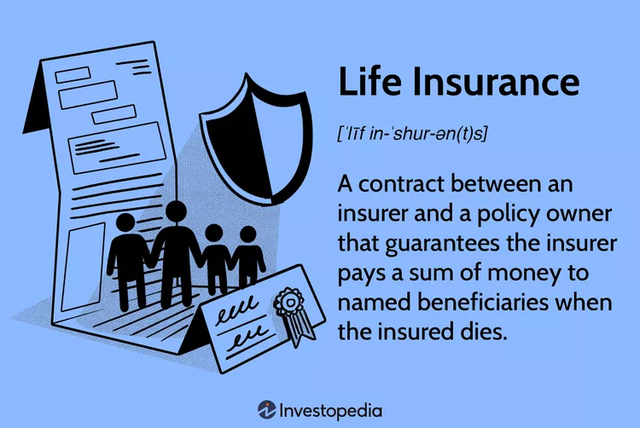
Rebecca Rosenberg
Jan. 3, 2024
Life insurance provides five financial benefits for you and your family. The main benefit of adding life insurance to your financial plan is that if you pass away, your heirs receive a lump sum, tax-free payout from the policy. They can use this money to pay your final expenses and to replace your income. Life insurance can also benefit you while you're still alive. Some policies pay out if you develop a chronic/terminal illness and some provide savings you can use to support your retirement.
In this article, learn about the various benefits of life insurance and why it may be a good idea to invest in it.
KEY TAKEAWAYS
- Life insurance offers benefits while you're still alive and when you pass away.
- When you die, life insurance pays out a lump sum death benefit, enabling your heirs to use this money to cover your final expenses and replace your income.
- Life insurance payouts generally are income-tax free.
- Some permanent life insurance policies build cash value, which is money you can take out while still alive.
- Life insurance could also pay if you develop a serious illness or go into a nursing home.

1. Life Insurance Can Cover Final Expenses
The U.S. national median cost of a funeral that includes a funeral and a burial was $7,848 as of 2021. The median cost of a funeral with cremation was approximately $6,971. Because many Americans do not have enough savings to cover even a $400 emergency expense, having to pay for a funeral can be a substantial financial burden for friends and family you leave behind. If you have a life insurance policy, your beneficiaries can use the money to pay for your burial expenses without having to dip into their own savings or use credit. Other covered final expenses may include additional funeral or cremation costs, medical bills, and estate settlement costs.
Some insurers offer final expense policies. These policies have low coverage amounts and relatively inexpensive monthly premiums. Final expense insurance helps beneficiaries avoid a financial crisis when a family member passes. Depending on your policy, this could include covering funeral costs, medical bills, auto loans, paying off a mortgage, or a down payment for a new home.
2. Your Dependents Will Have Money for Living Expenses
A common rule of thumb says your life insurance death benefit should be worth 10 times your income. If you have a policy (or policies) of that size, the people who depend on your income will still have money to cover their ongoing living expenses. Beneficiaries can use policy benefits to cover critical daily expenses like rent or mortgage payments, utility bills, and groceries. Average annual expenditures for households in 2022 were $72,967, according to the Bureau of Labor Statistics.
The exact amount of life insurance you should buy depends on your financial goals and other resources. You may want more if you'd like to cover other major expenses. For example, you'd like the insurance policy to pay for your children's college education so they don’t need to take out student loans. Alternatively, if you have a large sum of savings stored away, you may be okay with a smaller life insurance policy.
3. Life Insurance Payouts Are Tax-Free
If you have a life insurance policy and die while your coverage is in effect, your beneficiaries will receive a lump sum death benefit. Life insurance payouts aren’t considered income for tax purposes, and your beneficiaries don’t have to report the money when they file their tax returns.
However, a beneficiary may receive earned interest if they choose an installment payout option. Any interest received is taxable and must be reported as such. Depending on your state’s laws, life insurance benefits may be used to offset some or all of owed estate taxes. In this case, your heirs won’t have to liquidate assets or pay out of their inheritance.
4. You Can Get Coverage for Chronic and Terminal Illnesses
Many life insurance companies offer endorsements, also known as riders, that you can add to your policy to enhance or adjust your coverage. An accelerated benefits rider allows you to access some or all of your death benefit before you pass away. Under some policies, for example, if you are diagnosed with a terminal illness, you can use your death benefit while you’re still living to pay for your care or other expenses.
A long-term care (LTC) rider is another type of life insurance policy that pays for expenses not covered by traditional health insurance, such as a home health-care worker, long-term care facility, or nursing home care. The insurer may distribute your payout either as a lump sum, or as a monthly percentage of your death benefit (typically 1% to 4%). Most LTC policy riders have a waiting period (often 90 days) before you can start using the benefit.
5. Policies Can Supplement Your Retirement Savings
If you purchase a whole, universal, or variable life insurance policy, it can accumulate cash value in addition to providing death benefits. The cash value grows at a guaranteed rate determined by the policy provider. Growth is not affected by market conditions, allowing the funds to accumulate at a stable rate over time. Additionally, the cash value of whole life insurance grows tax-deferred. This means there are no income taxes accrued on the cash value (or its growth) until it is withdrawn.
As the cash value builds up over time, you can use it to cover expenses, such as buying a car or making a down payment on a home. You can also tap into it during your retirement years if you need to. If you decide to borrow against your cash value, the loan is not subject to income tax as long as the policy is not surrendered. The insurance company, however, will charge interest on the loan amount until you pay it back. Insurance companies have varying interest rates on these loans.
A life insurance policy should not replace traditional retirement accounts like a 401(k) or an IRA. What's more, cash value life insurance is considerably more expensive than term life insurance, which has no savings component but simply a death benefit.
An Underutilized Financial Tool
Life insurance can be essential for protecting your family financially in case of a tragedy, but many people go without it. In fact, nearly half of American adults do not have life insurance, according to a 2023 survey. One reason is that people assume life insurance is more expensive than it is. For example, 8 out of 10 Millennials overestimated the cost of life insurance in a 2022 study.
In actuality, the average cost is closer to $200 a year. If you think investing in life insurance may be a smart financial move for you and your family, consider consulting with a financial advisor to adopt it into your financial plan.
What Are the Main Benefits of Life Insurance?
The main benefits of life insurance are the tax-free death benefit for your heirs, the cash value you can use while still alive, and the extra coverage for nursing home care as well as terminal and chronic illnesses.
What Are the 5 Types of Life Insurance?
The five main types of life insurance are term life, whole life, universal life, variable life, and final expense coverage, also known as burial insurance. Each type has different features and benefits. For example, term is more affordable but has an expiration date. Whole life starts out costing more, but can last your entire life if you keep paying the premiums.
What Are 3 Things Life Insurance Covers?
Life insurance covers your final expenses, like a burial and funeral, when you pass away. It can pay off your debts and medical bills. Life insurance could also cover your mortgage and provide money for your family to keep paying their bills.
Who Really Needs Life Insurance?
If you have family depending on your income, you likely need life insurance to support them after you pass away. Stay-at-home parents and business owners also often need life insurance. Even if you don't have dependents, life insurance could help protect your loved ones against owing the cost of your final expenses and debt.
The Bottom Line
Life insurance benefits aren't just for the wealthy. No matter your income level, life insurance can ensure your loved ones could make ends meet if you were to pass away. It can also help you pay your bills while you're still alive. And, life insurance might be more affordable than you think. If you decide to get coverage, consider Investopedia's list of the best life insurance companies of 2023.



